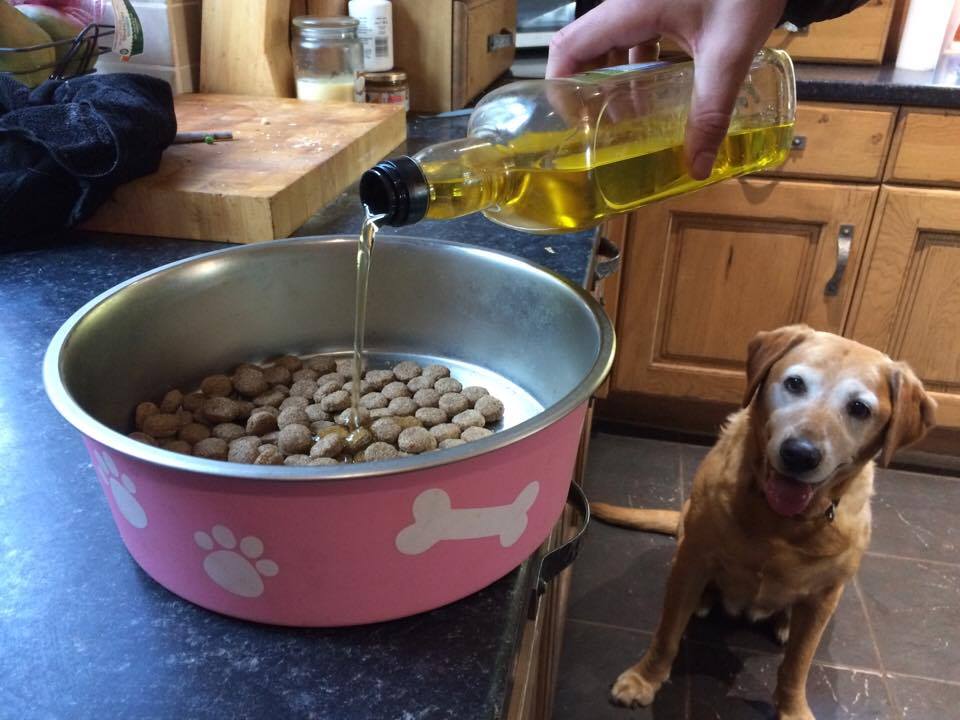As a dog owner, you may have wondered what foods are safe to feed your furry friend. One question that often arises is whether dogs can have food cooked in olive oil. Olive oil is a common ingredient in many human meals, but is it safe for our canine companions to consume?
There are several factors to consider when it comes to feeding dogs food cooked in olive oil. While olive oil can provide some health benefits for dogs, it can also have negative effects if consumed in excess. In this article, we will explore the pros and cons of feeding dogs food cooked in olive oil and provide guidance on how to make the best choices for your pet’s diet.
Yes, dogs can have food cooked in olive oil as long as it is given in moderation. Olive oil is a good source of monounsaturated fats and antioxidants that offer several health benefits to dogs. However, too much olive oil can lead to weight gain and digestive issues. Additionally, some dogs may be allergic to olive oil, so it is always best to consult a veterinarian before introducing it to your dog’s diet.

Can Dogs Have Food Cooked in Olive Oil?
If you’re a dog owner, you’re probably always looking for ways to make your furry friend’s meals more nutritious and tasty. One of the ingredients that many people use when cooking for their pets is olive oil. But is it safe for dogs to eat food cooked in olive oil? Let’s find out.
What Is Olive Oil?
Olive oil is a type of oil that is extracted from olives, the fruit of the olive tree. It is a staple of the Mediterranean diet and has been used for centuries in cooking and as a natural remedy for various health issues. Olive oil is high in monounsaturated and polyunsaturated fats, which are considered healthy fats that can help reduce inflammation and lower the risk of heart disease.
Is Olive Oil Safe for Dogs?
Yes, olive oil is generally safe for dogs to eat. In fact, it can provide some health benefits for your pet. However, it’s important to use it in moderation and to avoid certain types of olive oil.
The Benefits of Olive Oil for Dogs
Olive oil contains healthy fats that can improve your dog’s skin and coat. It can also help with digestion and reduce inflammation in the body. Additionally, some studies have shown that olive oil can help lower the risk of cancer in dogs.
The Risks of Olive Oil for Dogs
While olive oil is generally safe for dogs, there are certain types of olive oil that you should avoid. For example, extra virgin olive oil is high in oleocanthal, which can be toxic to dogs if consumed in large amounts. Additionally, if your dog has pancreatitis, you should avoid feeding them foods that are high in fat, including olive oil.
How to Use Olive Oil in Your Dog’s Diet
If you want to add olive oil to your dog’s diet, it’s best to start with a small amount and gradually increase it over time. You can mix it into your dog’s food or drizzle it over their kibble. It’s important to use only high-quality olive oil and to avoid any types that are high in oleocanthal.
How Much Olive Oil Should You Give Your Dog?
The amount of olive oil you should give your dog depends on their size and weight. As a general rule, you can give your dog 1 teaspoon of olive oil per 20 pounds of body weight per day. However, it’s always best to consult with your veterinarian before making any changes to your dog’s diet.
Conclusion
In conclusion, olive oil can be a healthy addition to your dog’s diet when used in moderation. It can provide some health benefits and improve the taste of your dog’s food. However, it’s important to use only high-quality olive oil and to avoid any types that are high in oleocanthal. As always, consult with your veterinarian before making any changes to your dog’s diet.
Frequently Asked Questions
As a dog owner, you want to make sure that your furry friend is getting the right nutrition. One question that often comes up is whether dogs can have food cooked in olive oil. Here are some answers to common questions about this topic.
Can dogs have food cooked in olive oil?
Yes, dogs can have food cooked in olive oil. In fact, olive oil can be a healthy addition to your dog’s diet. It is a good source of monounsaturated fats and antioxidants, which can help to reduce inflammation and support heart health.
However, it is important to use olive oil in moderation. Too much fat in your dog’s diet can lead to weight gain and other health problems. Additionally, some dogs may be sensitive to certain types of oils, so it is always a good idea to talk to your veterinarian before making any changes to your dog’s diet.
What are the benefits of feeding my dog food cooked in olive oil?
Feeding your dog food cooked in olive oil can provide a number of health benefits. Olive oil is rich in antioxidants, which can help to reduce inflammation and support a healthy immune system. It is also a good source of monounsaturated fats, which can help to reduce the risk of heart disease and other health problems.
In addition, olive oil can help to improve the taste and texture of your dog’s food. Many dogs find the taste of olive oil appealing, which can encourage them to eat more and improve their overall nutrition.
How much olive oil should I give my dog?
The amount of olive oil that you give your dog will depend on their size and nutritional needs. In general, it is best to start with a small amount and gradually increase the dosage over time. A good rule of thumb is to give your dog no more than one teaspoon of olive oil per 20 pounds of body weight per day.
It is important to monitor your dog’s weight and overall health when adding olive oil to their diet. If your dog starts to gain weight or experience any other health problems, it may be necessary to adjust their diet accordingly.
What are the risks of feeding my dog food cooked in olive oil?
Feeding your dog food cooked in olive oil is generally safe, but there are some risks to be aware of. One risk is that too much fat in your dog’s diet can lead to weight gain and other health problems. Additionally, some dogs may be sensitive to certain types of oils, which can cause digestive upset or other health problems.
It is always a good idea to talk to your veterinarian before making any changes to your dog’s diet. They can help you determine the appropriate amount of olive oil to give your dog and monitor their health for any potential problems.
What are some other healthy oils that I can give my dog?
In addition to olive oil, there are several other healthy oils that you can give your dog. Coconut oil is a popular choice, as it is rich in medium-chain triglycerides (MCTs) that can provide a number of health benefits. Fish oil is also a good option, as it is rich in omega-3 fatty acids that can support heart health and reduce inflammation.
It is important to choose high-quality oils that are appropriate for your dog’s nutritional needs. Talk to your veterinarian for recommendations on the best oils to give your dog.

In conclusion, dogs can have food cooked in olive oil, but it should be done in moderation. Olive oil is a healthy option for dogs as it contains monounsaturated fats that can improve their overall health. However, too much of it can lead to weight gain and other health problems, so it’s important to use it in small amounts.
It’s also essential to make sure that the food cooked in olive oil is safe for dogs to eat. Some human foods can be toxic to dogs, so it’s crucial to avoid using ingredients such as onions, garlic, and chocolate when cooking for your furry friend.
Overall, cooking food in olive oil can be a healthy and tasty addition to your dog’s diet. Just make sure to use it in moderation and avoid any potentially harmful ingredients. With the right balance, your dog can enjoy a delicious and nutritious meal cooked in olive oil.
